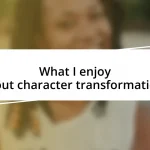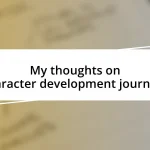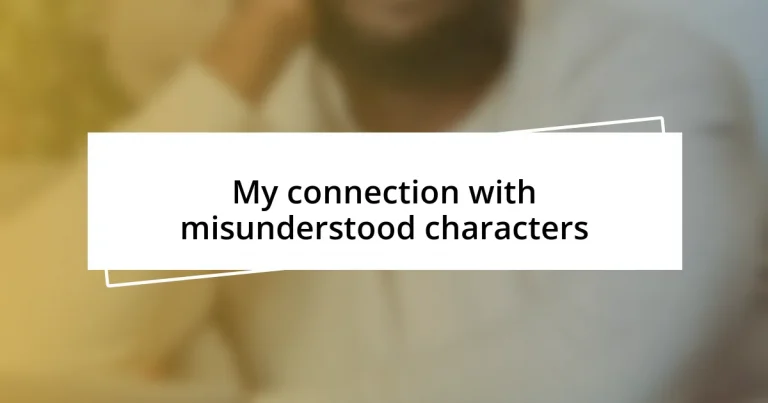Key takeaways:
- Misunderstood characters often have complex backstories that reveal their true motivations and emotions, challenging surface-level judgments.
- Character development in literature allows readers to find relatability in flaws and growth, emphasizing the universal quest for understanding and connection.
- Compassion and empathy towards others can be cultivated by recognizing our shared struggles and the hidden narratives behind misunderstood individuals.
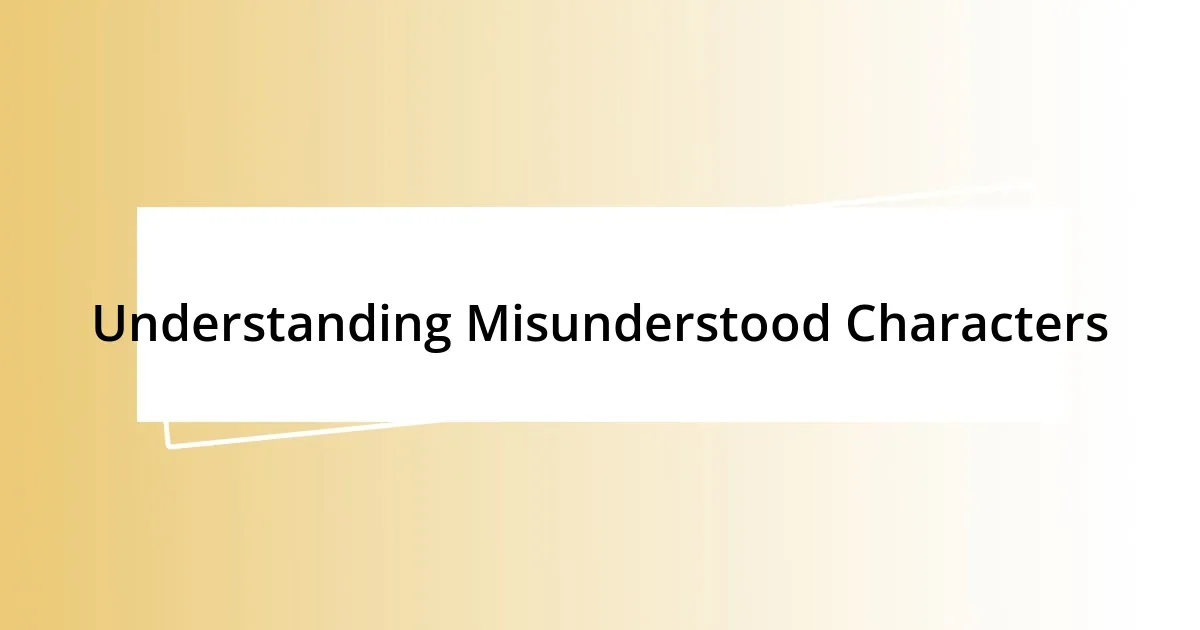
Understanding Misunderstood Characters
Understanding misunderstood characters can sometimes feel like peering into a mirror, where we see fragments of ourselves. I remember watching a film with a protagonist who seemed cruel at first but revealed a tragic backstory that explained their behavior. Hasn’t there been a time when you encountered someone who appeared abrasive but turned out to be a deeply empathetic individual?
Often, these characters resonate with us because they embody our struggles, fears, and insecurities. I recall a friend who felt like an outsider due to their quirky interests. It took time, but once I understood their passion, I appreciated their unique perspective on life. Isn’t it fascinating how a little understanding can shift our perception of others?
These characters invite us to explore the complexity of human emotion, highlighting how surface judgments can obscure deeper truths. I find it empowering to reflect on my initial impressions of others—how many times have I made snap judgments without really knowing their stories? Embracing these misunderstood figures can enrich our understanding of compassion and connection in our own lives.
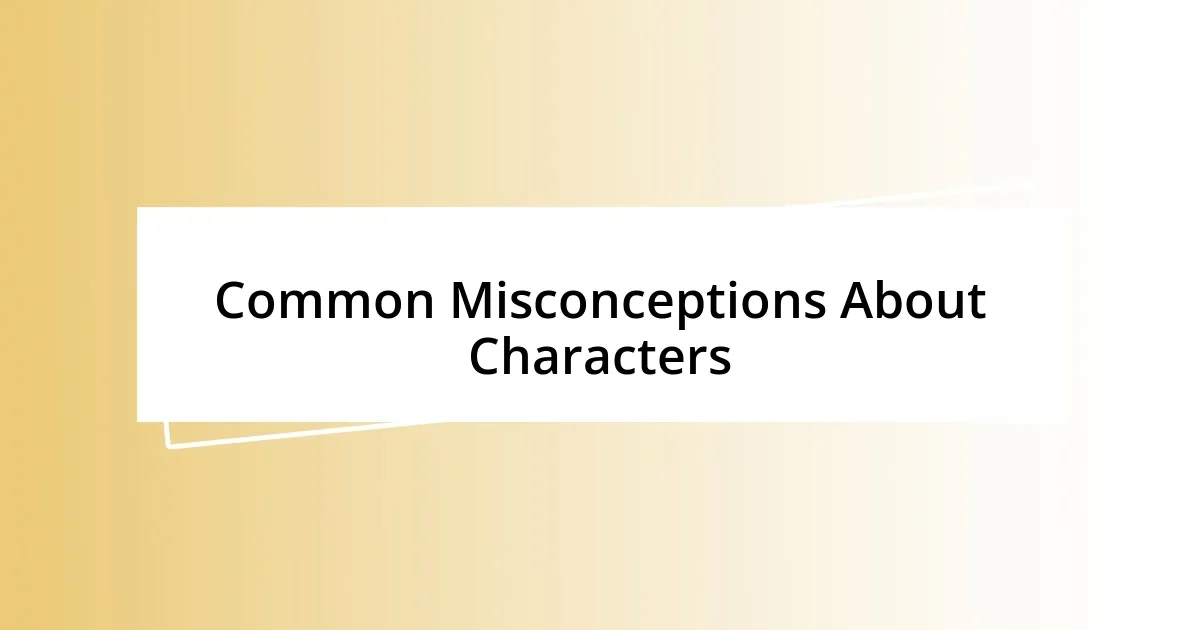
Common Misconceptions About Characters
Misunderstood characters often suffer from a single narrative that doesn’t capture their full essence. For example, I remember a book where the so-called “villain” turned out to be a protector of a community, acting out of desperation. It’s a mistake I’ve made myself—labeling someone without digging deeper into their motivations.
Another common misconception is that these characters lack depth, merely fulfilling a plot requirement. In my experience, many of these personas are layered, embodying complexities we might mirror in our own lives. Take, for instance, the shy classmate I dismissed early on; once I engaged with them, I discovered a wealth of experiences that changed my mind completely.
Lastly, viewers often assume that a misunderstood character will inevitably change for the better. However, I’ve found that true growth can be much more nuanced. Just like in life, where personal journeys don’t always lead to happy endings, characters may remain flawed yet relatable. That unpredictability often mirrors real-life experiences and speaks volumes about our own journeys of self-discovery.
| Common Misconceptions | Truths |
|---|---|
| They are purely evil. | They often have tragic backstories. |
| They are one-dimensional. | They embody complex emotions. |
| They will always redeem themselves. | Growth is often nuanced and unpredictable. |
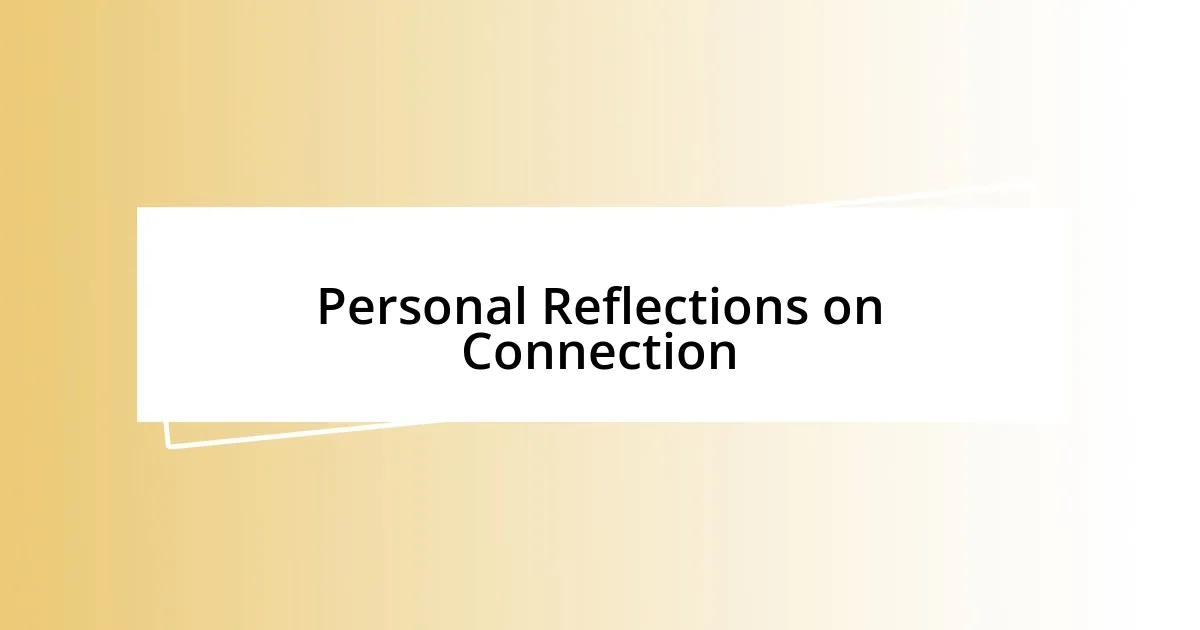
Personal Reflections on Connection
There’s something deeply relatable about connecting with misunderstood characters; it often feels like acknowledging a part of myself that’s been overlooked. I once had a coworker who seemed standoffish, but as I spent more time with them, I discovered they had been through a loss that made them hesitant to open up. It’s these revelations that remind me how crucial it is to dig beneath the surface to truly understand people.
- Misunderstanding can stem from personal experiences that shape our perceptions.
- Opening up to others often requires patience and empathy.
- Each connection has the potential to shatter preconceived notions and foster genuine relationships.
Reflecting on my connections, I realize how often I’ve misjudged individuals based on fleeting impressions. Just a few years ago, I met a neighbor who was aloof at first. Over time, a simple hello turned into meaningful conversations about our shared interests. That experience taught me that every connection has layers, inviting me to look deeper and celebrate the intricacies of the human experience.
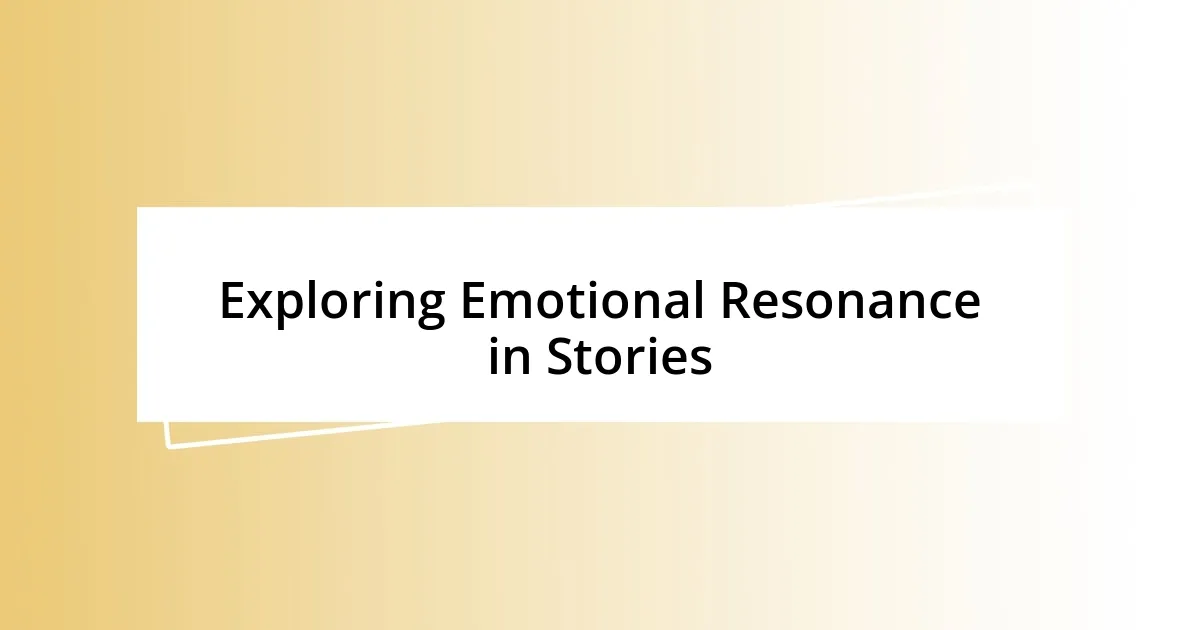
Exploring Emotional Resonance in Stories
When I dive into stories featuring misunderstood characters, I often feel a tug at my heartstrings. For instance, I remember reading about a character who was shunned for her unusual quirks. Initially, I found her difficult to relate to, but as the narrative unfolded, I discovered her backstory—filled with loneliness and longing for acceptance. Doesn’t it resonate with anyone who’s ever felt out of place?
There’s something inherently powerful about emotional resonance; it allows us to feel empathy for characters we might otherwise overlook. I recall a film where the so-called antagonist displayed acts of kindness hidden under layers of anger. This juxtaposition made me reflect on how we all wear masks in our daily lives. Have you ever considered how your own struggles might twist your intentions in the eyes of others?
My experience with literature often reveals that emotional depth transforms perception. I once connected with a novel’s protagonist whose actions seemed selfish but were driven by survival instincts. This reminded me of times when I, too, have made choices that others viewed unfavorably, only to realize I was just doing my best in the moment. Essentially, these narratives encourage me to embrace the flaws we all harbor and recognize that beneath those flaws lies the universal quest for understanding and connection.
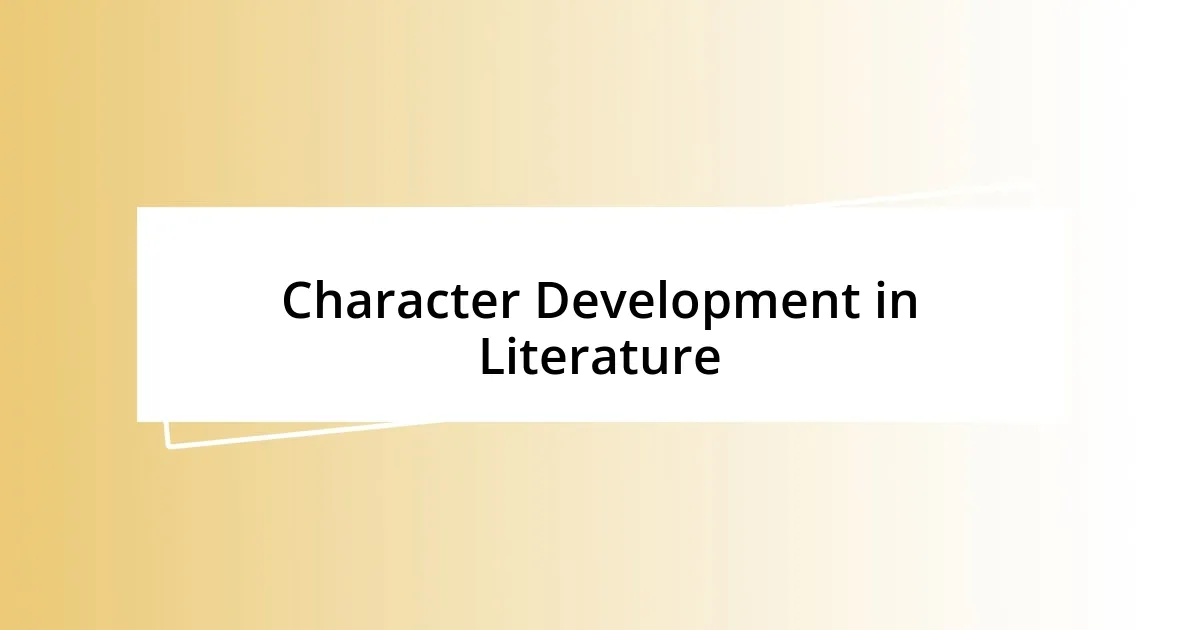
Character Development in Literature
Character development in literature is fascinating because it reveals the layers that form our understanding of individuals. I remember reading a novel where the main character, painted as a villain, had a backstory filled with heartbreak and betrayal. This shift in perspective made me realize how vital it is for authors to craft multidimensional characters that invite readers to question their initial judgments. Isn’t it intriguing how our perceptions can evolve with deeper insights?
As I reflect on various stories, I notice that development often hinges on relatable flaws. Take the protagonist in a story I recently explored; her impulsive decisions led to chaos, but as I learned about her background—marked by instability—I couldn’t help but empathize. It’s moments like these that highlight how character flaws are not just obstacles but opportunities for growth. Have you ever found yourself rooting for a character precisely because they reminded you of your own struggles?
Moreover, character development serves as a mirror reflecting our own journeys. I once connected deeply with a character striving for redemption after a major mistake. Her struggle resonated with me, especially during a time when I, too, sought forgiveness within my own relationships. This connection underscores that characters are not just figments of imagination; they embody struggles and triumphs that many of us experience, enriching our understanding of human nature.
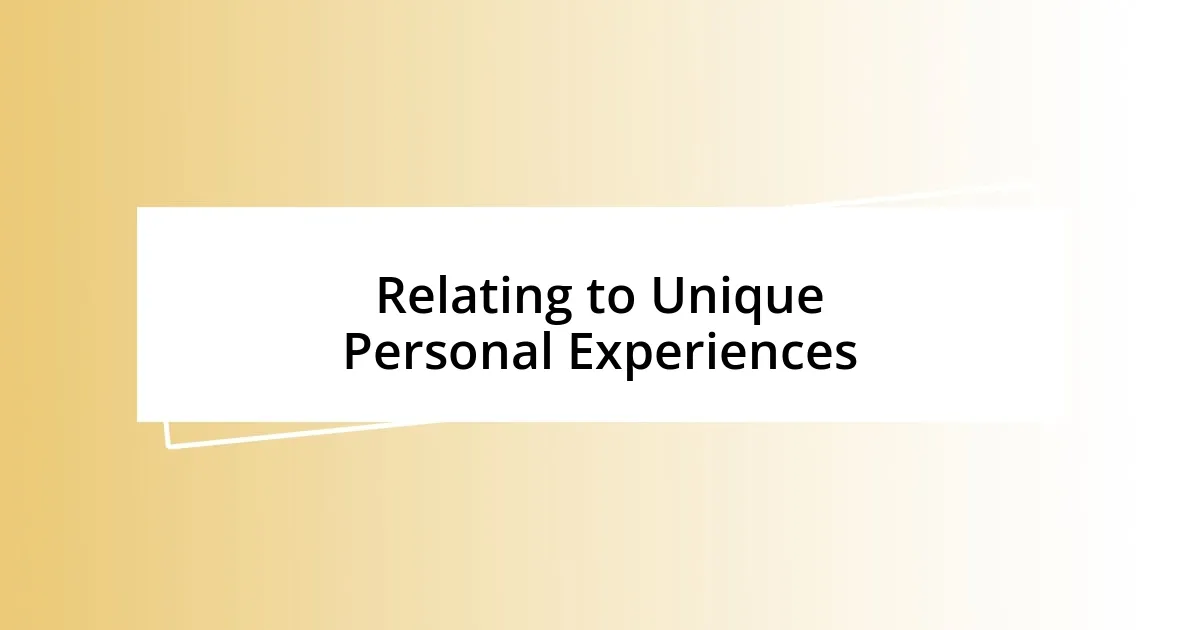
Relating to Unique Personal Experiences
When I reflect on my unique experiences, I can’t help but remember a time when I felt like an outsider. I was in a new school, surrounded by kids who had known each other for years. This feeling of disconnection made me appreciate characters who navigate similar turbulent waters. Don’t you think that longing for belonging fuels so many stories?
Engaging with characters who confront their differences often brings me comfort. I recall a story about a young artist whose work was misunderstood by everyone around her. She reminded me of my own early days as a writer, when my words felt like they fell on deaf ears. Have you ever felt that your passions were dismissed, only to find deeper meaning in your journey later on?
One standout moment in my reading journey involved a character who transformed images of despair into opportunities for hope. Her struggle with self-identity versus societal expectations paralleled my own feelings about following an unconventional career path. It made me realize that, much like her, I, too, am carved by my experiences and choices. How incredible is it that our scars often weave the most beautiful stories of resilience?
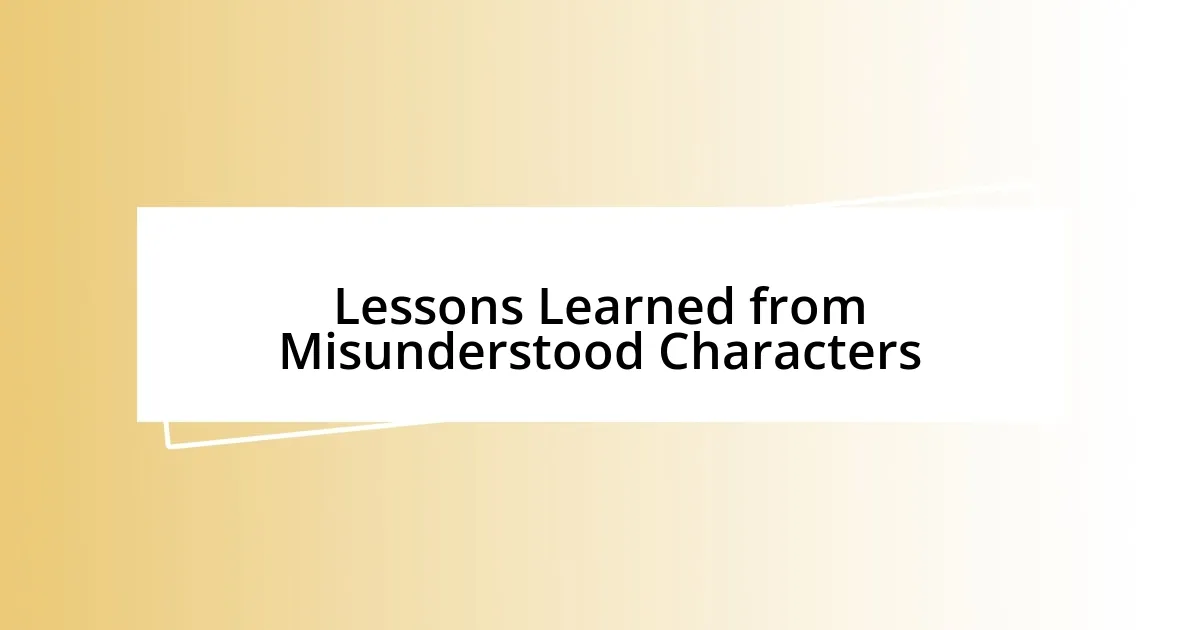
Lessons Learned from Misunderstood Characters
Misunderstood characters often teach me the importance of compassion. I recall a book where the “villain” had moments of vulnerability that revealed his loneliness. It made me think about how easy it is to label someone without understanding the pain they might carry. Have you ever judged someone harshly, only to learn that they were fighting battles you couldn’t see?
From my experiences, I’ve learned that growth often sprouts from adversity. In a story I loved, there was a character who struggled to fit in and made mistakes along the way. Her journey resonated with me because I faced similar challenges in high school, trying to navigate friendships while staying true to myself. It’s a reminder that learning from our missteps can forge stronger connections with others. What about you? Have the moments of feeling misunderstood shaped your relationships too?
Another profound lesson I take away from misunderstood characters is the power of self-acceptance. I once read about a character shunned for her quirks, but as the plot unfolded, she grew bolder in embracing who she was. This reflected my own journey of embracing my unique qualities, especially when I initially felt pressured to conform. Isn’t it freeing to recognize that our differences can actually be strengths that enrich our lives?
